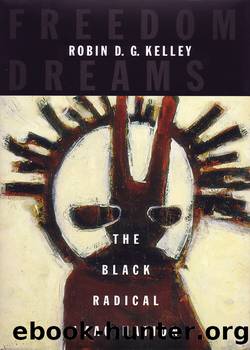Freedom Dreams by Robin D.G. Kelley

Author:Robin D.G. Kelley [Kelley, Robin D. G.]
Language: eng
Format: epub
ISBN: 978-0-8070-0978-9
Publisher: Beacon Press
Published: 2002-04-14T16:00:00+00:00
The RNA experienced more than its share of state repression during the late 1960s and 1970s; several of its members, including Imari Obadele, were jailed on charges ranging from assault to conspiracy and sedition. But the RNA survived, reconstituted itself as the New Afrikan Movement, and continued to press for reparations through NâCOBRA. Imari Obadele, founder of Nâ-COBRA, drafted a plan for reparations that went far beyond the RNAâs âAnti-Depression Program.â Presented to the U.S. Congress in 1987, the document was called âAn Act to Stimulate Economic Growth in the United States and Compensate, in part, for the Grievous Wrongs of Slavery and the Unjust Enrichment which Accrued to the United States Therefrom.â In this plan, Congress would be obliged to pay out not less than three billion dollars annually to African Americans. One-third of this sum was to be paid directly to families; another one-third would go to the duly elected government of the Republic of New Afrika. (Elections would be monitored by the UN or some comparable international body.) The remaining one-third would support a National Congress of Organizations composed of churches, black civic organizations, and community-based movements committed to ending âthe scourge of drugs and crime in New Afrikan communities and [advancing] the social, economic, educational, or cultural progress and enrichment of New Afrikan people.â Participating groups would have had to been in operation for a minimum of two years before the passage of legislation.
Knowing that the United States would not simply hand over the Southern states, Obadele proposed a plebiscite to determine the will of the black community for a separate state. Employing carefully worded, legalistic language, the plan required that at least 10 percent of the black population older than sixteen years of age sign petitions before such a plebiscite could be held. The petition process would be overseen by judges appointed by the president of the United States, the UN, and the RNA. The sovereign status of each state in question, then, would be determined by a majority of voters. If the majority of voters elected to become part of the Republic of New Afrika, residents of these states could leave and maintain U.S. citizenship, stay and become citizens of the RNA, or enjoy dual citizenship irrespective of where they lived. What is not clear from the document, however, is whether or not white people can choose New Afrikan citizenship or residency in the South. Judging from the carefully worded and extremely democratic tone of the document, it seems quite possible that nonblack people fully committed to black liberation and a âNew Afrikanâ way of life could join the republic, though it is not encouraged.
On May 19, 1999 (Malcolm Xâs birthday), NâCOBRA did hold a plebiscite on reparations, though the purpose was to raise community awareness and mobilize African Americans to elect âeconomic development commissionersâ (EDCs) who would serve as local organizers for the reparations campaign. Preparation for the plebiscite gave NâCOBRA an opportunity to circulate its latest âmain and immediate demands.â These included:
Download
This site does not store any files on its server. We only index and link to content provided by other sites. Please contact the content providers to delete copyright contents if any and email us, we'll remove relevant links or contents immediately.
Blood and Oil by Bradley Hope(1558)
Wandering in Strange Lands by Morgan Jerkins(1410)
Ambition and Desire: The Dangerous Life of Josephine Bonaparte by Kate Williams(1380)
Daniel Holmes: A Memoir From Malta's Prison: From a cage, on a rock, in a puddle... by Daniel Holmes(1324)
Twelve Caesars by Mary Beard(1310)
It Was All a Lie by Stuart Stevens;(1291)
The First Conspiracy by Brad Meltzer & Josh Mensch(1166)
What Really Happened: The Death of Hitler by Robert J. Hutchinson(1154)
London in the Twentieth Century by Jerry White(1141)
The Japanese by Christopher Harding(1129)
Time of the Magicians by Wolfram Eilenberger(1125)
Twilight of the Gods by Ian W. Toll(1110)
Cleopatra by Alberto Angela(1091)
A Woman by Sibilla Aleramo(1089)
Lenin: A Biography by Robert Service(1071)
John (Penguin Monarchs) by Nicholas Vincent(1062)
Reading for Life by Philip Davis(1023)
The Devil You Know by Charles M. Blow(1019)
The Life of William Faulkner by Carl Rollyson(976)
